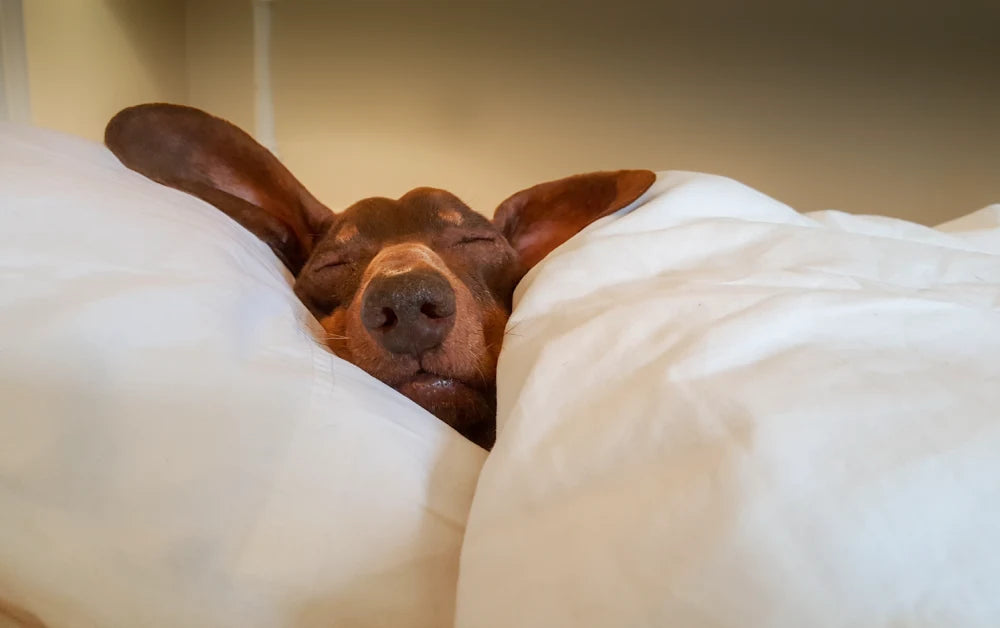We’re deep in the middle of winter, and something that becomes apparent every year is that there are two types of people in the frigid season. Some people are hibernators, staying in the house (and therefore staying warm!), sleeping plenty and generally resting up until warmer weather. Others are more of the go-getting type, getting outside no matter the conditions and soaking up whatever sunlight is to be found. No matter which type you are, it’s important to not only get plenty of sleep, but also be mindful of how you’re sleeping.
During the winter, the changed hours and short days can have a huge toll on our sleep schedules, drastically shifting them and changing how we feel in the process. Some people suffer from Seasonal Affective Disorder (also known by the laughably apt acronym SAD), which can further affect sleep schedules. There’s generally less sunlight to go around during winter, meaning the rest we get is extra important to help our bodies feel normal and in shape. If you’re someone who sleeps differently or worse during the winter months, fear not! There are plenty of tried-and-true methods out there to help you out.
Exercise
Exercise is pretty common advice to help out with most problems, and it can get pretty annoying when everyone just tells you to go for a run to fix anything you’re dealing with. But...it’s true! This one definitely isn’t only helpful during winter, but the benefits intensify during the cold season. Exercise helps with depression symptoms, and this includes symptoms of SAD, which include restlessness or trouble sleeping.
Additionally, making a point of exercising in the morning or the evening can help regulate your biological clock. While your brain may be confused about when to be awake or resting because of the shifted and shortened hours of daylight, exercise tells your brain to get active and working. If you get into a habit of it, it can help you feel more awake starting your day. If you’re having trouble staying awake once it gets dark at 6PM, schedule a run or other activity for around this time. Your brain will eventually get used to this and you’ll feel more awake for longer.
Avoid eating too late
Some of us stay up later than we should during the winter, and hey, it’s pretty easy to understand why. Who doesn’t wanna just snuggle into bed, watch the snow and stay up late with a movie and some snacks?
Unfortunately for us midnight snackers, this can be a real detriment to our sleep. Once you have a little bit of food late at night, your body goes into digestion mode and it becomes a lot harder to sleep. Your circadian rhythm can ultimately get shifted if you do this enough, meaning it will be hard to sleep even when you’re not eating! Plus, we all know that food gives us energy, and having a ton of energy is an obvious no-go when it comes to falling asleep.
It’s best to avoid snacks near bedtime for this reason. If the temptation becomes too strong, stick to something small in calories and without a ton of sugar. You got this!
Don’t get a dry nose!
This one might sound a little weird, but bear with me. The cold, dry air in the winter can have intense drying effects on our nasal passages. Indoor heating can also dry out your nose, which is obviously amplified during winter. When this happens, snoring and other breathing issues can follow, particularly during sleep when you’re not in control of how you’re breathing. This isn’t good! Not breathing smoothly really interrupts restful sleep (ever woken up from a snore, or is that just me?). Plus, if you sleep with someone else, they probably don’t like it much either, even if they don’t say anything!
To help with this, consider a humidifier for your room. Most single-room humidifiers don’t cost too much are readily available at most hardware stores. If that is too much of a hassle, saline solution sprays or Neti pots can become your best friend in keeping your nose nice and moist (yikes, that sentence felt a little gross to type…).
Watch the temperature
If you’re anything like me, it’s seriously satisfying to hop into bed on a cold night, pile blankets on top of you as high as you can, and fall asleep like a toasty, blissful blanket monster. Waking up sweaty? It’s worth it.
As much as I personally love this, it is sadly not optimal. While science is currently a bit divided on what temperature is best for sleep, most modern research points towards cooler temperatures being preferable for rest. Having a temperature around 65 on the thermostat is recommended, whether it’s winter or not. With that being said, those of us with poor circulation should still take care to keep those parts warm. Wool socks or other layers for our chilly extremities can be a big help in making sure our body is at a regulated, cool-ish temperature.
Stick to a schedule
This sounds obvious, but it’s a tip that most of us don’t take seriously in the winter. I feel like naps are way more appealing during the winter, something that can make us stay up or wake up too early or too late. This isn’t good, and these changes end up compounding over time and leaving us with messed up sleep rhythms.
The way to combat this? Well, no more naps, if you want to know what’s really good for you and your sleep. It’s also important to actually choose a static bedtime that doesn’t change all that much. While this can be tough, it will really help in making sure you get enough sleep, and that your body is ready for sleep once you get in bed. Waking up at the same time every day helps in the same way, as well. A simple alarm on your phone for bedtime and waking up goes a long way. It’s the little things, folks!
Taking care of yourself is hard, and for some of us it gets a lot harder during the winter. Making sure our sleep schedule is good is one of the most important things we can do to feel better; we all know how crappy a day after a sleepless night is. Make a few little changes and just see how much better you feel!

